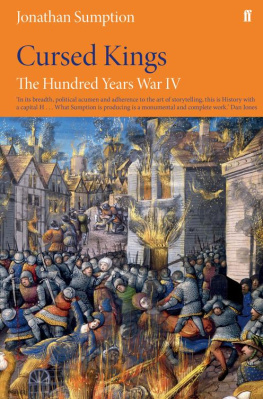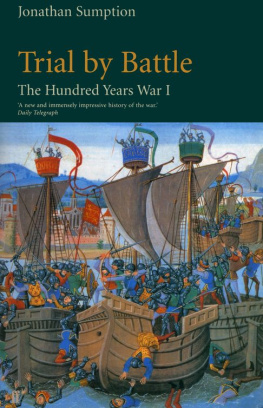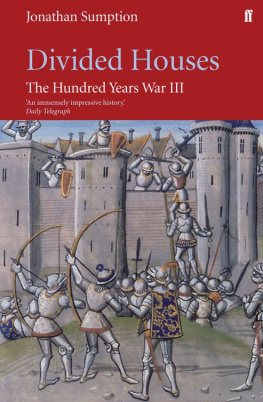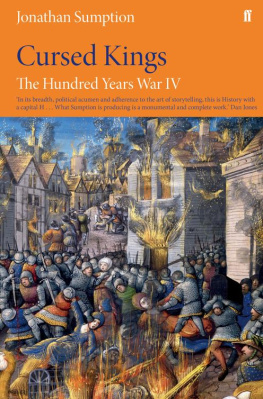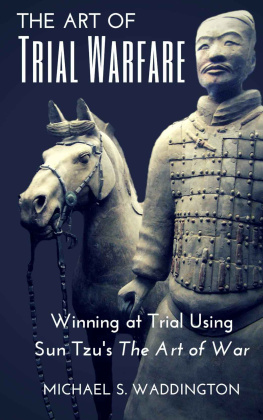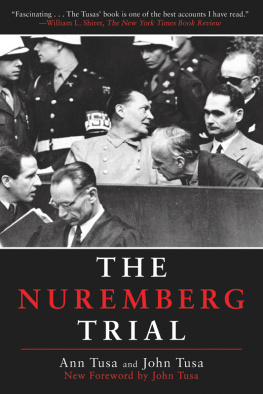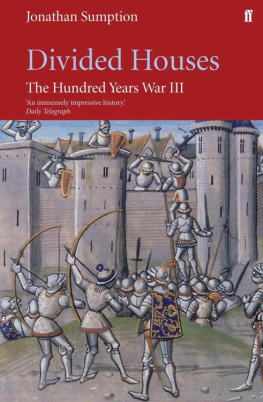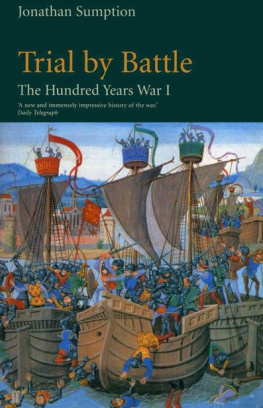Sumption - 1991;2009;
Here you can read online Sumption - 1991;2009; full text of the book (entire story) in english for free. Download pdf and epub, get meaning, cover and reviews about this ebook. City: France;Great Britain, year: 1991;2009;2011, publisher: Faber and Faber;University of Pennsylvania Press, genre: History. Description of the work, (preface) as well as reviews are available. Best literature library LitArk.com created for fans of good reading and offers a wide selection of genres:
Romance novel
Science fiction
Adventure
Detective
Science
History
Home and family
Prose
Art
Politics
Computer
Non-fiction
Religion
Business
Children
Humor
Choose a favorite category and find really read worthwhile books. Enjoy immersion in the world of imagination, feel the emotions of the characters or learn something new for yourself, make an fascinating discovery.
1991;2009;: summary, description and annotation
We offer to read an annotation, description, summary or preface (depends on what the author of the book "1991;2009;" wrote himself). If you haven't found the necessary information about the book — write in the comments, we will try to find it.
1991;2009; — read online for free the complete book (whole text) full work
Below is the text of the book, divided by pages. System saving the place of the last page read, allows you to conveniently read the book "1991;2009;" online for free, without having to search again every time where you left off. Put a bookmark, and you can go to the page where you finished reading at any time.
Font size:
Interval:
Bookmark:
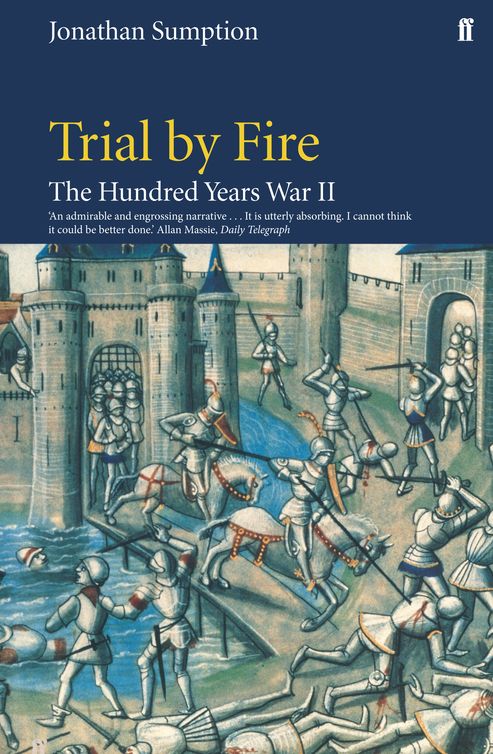
To Bernard
Inthetext
Attheend
At most times, war has been the principal collective enterprise of mankind. It has given human societies their identities. It has shaped their institutions, and provided the ultimate test of their solidity. This volume tells the story of a prolonged crisis in the affairs of France, the richest and most advanced society of late medieval Europe, which had in a real sense been formed by war and in the 1350s was almost destroyed by it. The strain of continual invasion, the financial and economic problems of defence, the shock of a grave and unexpected defeat in battle, combined for a brief period to bring the French state to the verge of extinction and to dissolve bonds of civil society which men had taken for granted for more than a century. As at similar crises in the history of France, in 1792 and 1870, these events were accompanied by savage recriminations among Frenchmen: venomous argument in elected assemblies; an unsuccessful revolution in Paris and another among the peasant communities of the north.
The main theme of this volume, however, is not destruction but survival. Stable communities are remarkably resilient in the face of catastrophe. The cities and rural communities of France survived, damaged and impoverished but intact, to undo most of Edward IIIs work in the following generation. There is no symmetry in war, and although France was defeated, England was not victorious. The English achieved a brief and flattering peace, which lasted for just nine years in the 1360s. They did this not by sustained military pressure, but by capturing the King of France, John II, who was able to impose it on his subjects. Englishmen and Gascons caused immense destruction in the territory of France, but they conquered very little of it. They crashed like great waves over the country, then ebbed away. They lacked the administrative and financial resources to impose a thorough-going occupation, something that only the police states of the nineteenth and twentieth centuries have been able to achieve, and then only for short periods.
These events were recorded by those who lived through them in some of the most vivid narratives to survive from the medieval period. As the English chronicle tradition faded, the French one came into its own. Pierre dOrgement (or whoever else wrote the continuation of the GrandeschroniquesdeFrance) lived through the Parisian revolution of tienne Marcel as one of the Dauphins entourage, and described it in language which loses nothing by its laconic, passionless style. Jean de Venette witnessed the same events as a resident of the city. The Castilian chronicler Ayala had served both rivals for his countrys crown and commanded a division in the disastrous battle of Njera. The Northumberland chronicler Thomas Gray of Heton fought in Scotland and the poet Chaucer in France.
For all their literary qualities, however, these sources need to be approached with the same caution which one brings to reading newspaper accounts of modern wars. Those who work daily in the law courts will know how fallible even eye-witnesses can be. To write the history of the fourteenth century from Froissarts elegant but muddled and inaccurate chronicle, as some nineteenth-century historians tried to do, would be absurd. One might as well use Shakespeare, or indeed Donizetti. The present volume is based primarily on the record sources, printed and unprinted, of England, Scotland and France, and on those of the Papacy and the Spanish kingdoms. Some of these convey the atmosphere of these appalling years with as much dramatic intensity as the most colourful chronicles. The French chancery registers, for example, in which ordinary Frenchmen confessed their misdeeds to the state in order to be pardoned, provide countless miniature autobiographies in which the war can be seen through the eyes of its lesser actors and victims.
In these and other respects, the principles on which this history is written were explained in the preface to the first volume, published in 1990, and have not changed.
J.P.C.S.
Greenwich
April 1998
The rain fell in England throughout the summer of 1348 as, amid a landscape of mud and flattened grain, men celebrated a decade of war and three years of victory. In a succession of opulent tournaments in the spring at Reading, Bury St. Edmunds, Lincoln and Eltham, teams of horsemen dressed in bulky padded armour and huge decorated pot-helmets rode into the lists to fight each other with blunt lances according to the stylised convention of lawyers, heralds and romancers. At Lichfield, where one of the most splendid of these pageants was held at the beginning of May, the King, disguised in the armour of one of his household knights, entered the lists with his companions dressed in uniform blue and white, their horses covered in blue velvet, gold plate and silk. Twenty-eight ladies of the court assisted them in the procession, wearing extravagant fancy dress of the same colours. Nearly 300 more watched among the supporters from the boundaries, peering at the spectacle through the eye-slits of fantastic decorated masks. Thus did they squander their wealth and deck out their bodies with the trappings of frippery, buffoonery and lust , an unfriendly observer wrote; not one of the men whom they were serving seemed to realise that their victories were a gift from the God of all bounty, the true benefactor of the chivalry of England.
Perhaps they did not. When, at Windsor some six weeks later, Edward IIIs court celebrated the churching of the Queen after the birth of her sixth son, the tournament teams included all the most famous of the Kings prisoners of war: the Count of Eu, Constable of France, carried off the prize; the lord of Tancarville, Chamberlain of Normandy who, like the Constable, had been captured at Caen as he tried to halt the advance of the English army through Normandy in July 1346; there was a handful of the survivors of the terrible slaughter of the French army at Crcy, a month later; David II, King of Scotland, taken at Nevilles Cross as the largest Scottish army to invade England for many years dispersed and fled around him; and Charles of Blois, claimant of
Beyond his realm Edwards reputation had never been higher. After years in which his campaigns had failed, his continental alliances had fallen apart, his debts had mounted and his pretensions had come to seem increasingly absurd, men watched in astonishment as the King overwhelmed the foremost military power of Europe. Petrarch was to proclaim the transformation of the English from the most timid of all the uncouth races into the supreme warriors of Europe. The protagonists in a German civil war offered Edward the Crown of Germany, which he had the good sense to refuse. The King of Castile, whose realm had moved in the orbit of France for more than a century, betrothed his heir to Edwards daughter Joan. Alfonsos ambassadors were pointed out among the courtiers attending Edwards great tournament at Lincoln in April 1348. Princes and noblemen of France, Germany and the Low Countries laid their disputes before him as, once, their forebears had laid them before Edward I at the height of his fame.
Some of these men believed that Edward III had only to press his advantages in order to achieve complete victory. Yet, between the truce of Calais in September 1347 and the autumn of 1355, a period of eight years, the English King fought no major campaign on the continent. He clung on to what he held. His commanders fought off raids and launched others of their own. He watched as the war became a formless mle fought between small forces of half-disciplined soldiers and punctuated by ill-observed truces. The reason was lack of money, the perennial problem which had limited all his enterprises. Walter Chiriton, the London financier whose syndicate had paid most of the cost of the siege of Calais, crashed in April 1349, a victim of the Kings duplicity and of his own dishonesty and greed. Edwards ministers turned to more orthodox methods of public finance as much from necessity as conviction. The debt generated by the campaigns of the mid-1340s was gradually paid off, a process which was still continuing well into the next decade. Chiritons affairs were wound up over a period of two years by his creditors and guarantors. The revenues of the customs had been mortgaged to Chiriton years before. Edward did not
Font size:
Interval:
Bookmark:
Similar books «1991;2009;»
Look at similar books to 1991;2009;. We have selected literature similar in name and meaning in the hope of providing readers with more options to find new, interesting, not yet read works.
Discussion, reviews of the book 1991;2009; and just readers' own opinions. Leave your comments, write what you think about the work, its meaning or the main characters. Specify what exactly you liked and what you didn't like, and why you think so.


